Table of contents
- Blogging developer communities
- 1. Hashnode
- 2. Dev.to
- All-purpose developer communities
- 3. Stack Overflow
- 4. Reddit
- 5. CodeProject
- 6. WebDeveloper.com
- Collaboration communities
- 7. GitHub community
- 8. Bitbucket
- Tech news and product updates communities
- 9. Hacker News
- 10. Product Hunt
- Software development communities for beginners
- 11. freeCodeCamp
- Specific-purpose developer communities
- 12. CodePen
- 13. Oracle Java community
- 14. Reactiflux
- 15. SitePoint community
- 16. Digital Ocean community
- 17. WordPress.org
- 18. Magento Forums
- 19. Blockgeeks
- 20. Gamedev.net
- 21. Thales – IoT developer community
- Mobile developer communities
- 22. Developer.android
- 23. Developer.apple
- Communities for developers to land a job at
- 24. Angel.co
- 25. Technology jobs LinkedIn group
- Conclusion
- FAQ
Where do developers go when they hit the programming wall, and what do they use to learn, share and hang around?
That’s right – developer communities.
Where would we be without them..
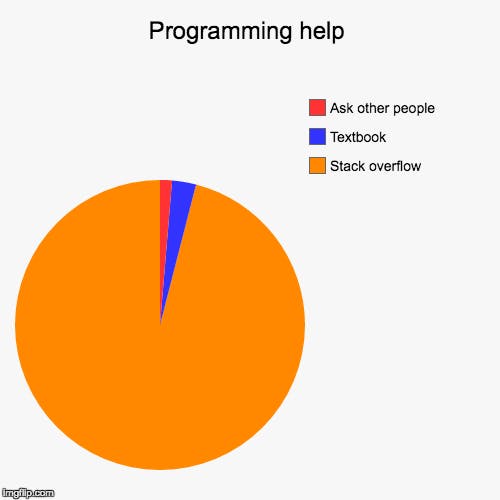
Developer communities are probably the best source of free information, code examples, debugging and collaboration opportunities, and updates from the industry leaders.
That rings true for the next generations of developers who are learning more from online communities like forums than they are from school curriculums, as the latest Stack Overflow’s survey reports.
Considering that 76% of software developers work remotely and that 59.5% of them have increased their productivity in the remote environment, you can understand why it’s important to join an active global community of developers.
Not to mention that contributing to a community is the developers’ nature. Without it, we wouldn’t have Linux. Without Linux, we wouldn’t have secure servers that host all our repositories, Amazon wishlists, Spotify playlists, and Facebook memories from ten years ago (thanks, Mark!).
In today’s top 25 most active developer communities list, you will see:
- All-purpose communities
- Collaboration communities
- Blogging developer communities
- News and product updates communities
- Software development communities for beginners
- Specific software development communities (markup, scripting, object-oriented and niche programming languages, frameworks, blockchain, gaming etc.)
- Mobile developer communities
- Communities to land a job at
So without further ado, let's start with the blogging communities.
Blogging developer communities
Developers can be bloggers too.
Most communities do have a blog section.
Some, however, are predominantly existing as blogging communities, and they nurture the long-form, conversational approach to technical topics. Let’s see what they do.
1. Hashnode
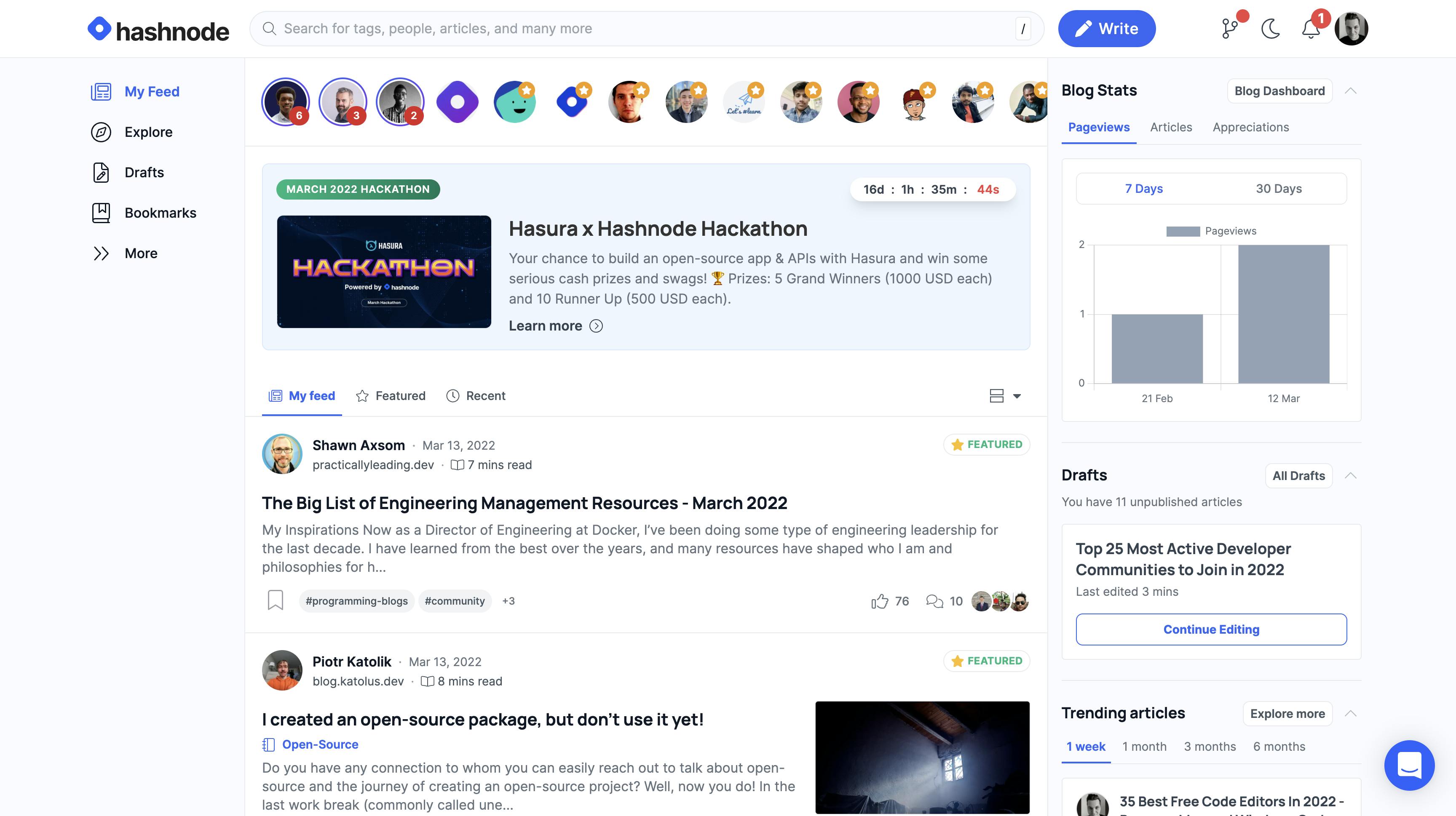
Hashnode is a hassle-free blogging platform for engineers, thought-leaders, and the dev community! Hashnode is the only dev community that enables you to blog on your personal domain but also helps you find an audience by sharing your articles with millions of devs.
Here are our favorite Hashnode features and why you should consider Hashnode as the next dev community you should join.
- Blog on your personal domain and own your content. Map your domain in seconds and get a high-perfomance, secure and fully-optimizied dev blog.
- No paywal. Read unlimited articles, for free, forever.
- No ads. Because we want to deliver an impeccable experience to your readers we will not show ads on any of your articles.
- Find an audience. Every time you write an article, Hashnode automatically shares it with the dev community members on the homepage. Even if you blog on a personal domain.
- Free built-in newsletter. Your readers will see a subscription form on your blog home and individual post pages.
- Hashnode powered blogs are blazing fast. Hashnode blogs have perfect perfomance and accessibility and SEO score.
- You can backup your posts on GitHub as Markdown files and decide to save them as private or public repositories.
- Write in markdown using the distraction free editor.
- You get to have a say about what you should read on Hashnode. That’s what the Request For Articles (RFA) section is for. The section is not available unless you register. Before requesting an article, take some time to upvote some existing requests and potentially find if what you’d ask for was already requested.
- Integrations are abundant: Google Analytics Tracking ID, Fathom Analytics Site ID, Facebook Pixel ID, Plausible Analytics, Hotjar Site ID, Matomo Analytics, Meta Tags, Web Monetization Payment Pointer.
- Embeds aren’t lagging behind either: CodePen, Tweets, Youtube Videos, Glitch, GitHub, Gists, Soundcloud, Anchor, Facebook Public Posts, Spotify, Instagram, Posts., Giphy GIFs., Runkit., CodeSandbox.
- You can listen to articles as audio blogs.
- Auto-generated table of contents for a better reading experience for your audience.
- Monthly hackatons with cash prizes.
- Built-in advanced analytics. You get real-time data on your views, visitors, averega visit time, your best perfoming pages and so much more.
- Article series for better content organization.
| Founded | June 2020 |
| Place | Delaware |
| Built on | Next.js |
| Free version? | Free version only and no paywall either |
2. Dev.to
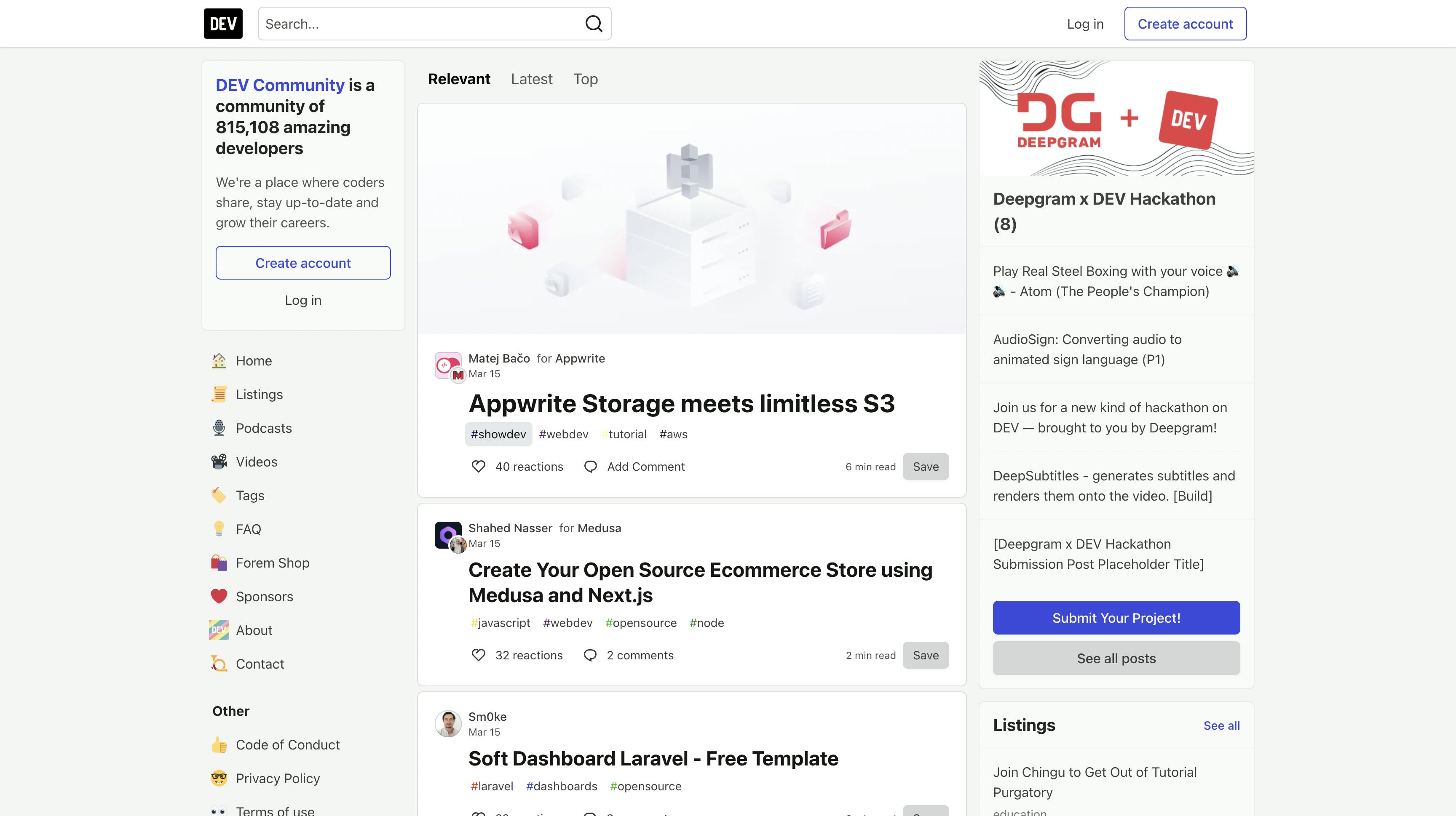
Dev is, at its core, a blogging platform for developers who like to share knowledge.
However, it comes packed with so many additional features that you’ll be happy to stay for a myriad of other reasons:
- Asking questions through the help tag where you’ll find support from experienced professionals
- Collaborating, finding work, finding a mentoring partner, finding courses, products, taking part in events through the Listing feature.
- Watching videos and podcasts
Tags with the most published posts are: #javascript, #webddev, #beginners, #programming, #tutorial. Judging by the most popular tags, you can assume that Dev is indeed a welcoming environment for rookie developers and those in the making.
Another feature that makes this platform stand out is the Markdown editor that allows you to embed so much into your posts, for example – GitHub core features ( repositories, pull requests, comments, gist), CodePen, and JSFiddle.
There are some minor setbacks to using Dev:
- Tags are only displayed according to the number of posts, and within them, you can only filter by relevant, latest and top.
- You can’t save podcasts to your reading list to listen to them later.
| Founded | 2016 |
| Place | NYC |
| Built on | Forem |
| Free version? | Yes |
| Pricing (for API development and integration consulting) | Yes (needs-based) |
All-purpose developer communities
These are the communities you must have heard of if you aren’t already an active member of at least one. These are the communities developers of all kinds congregate in for all sorts of purposes – asking and answering questions, sharing the sense of togetherness, sharpening their CodePens, or looking for gigs.
They are the most active communities out there, and regardless of how specific your question is or how niche are the programming languages you use, they’ll have you covered.
So let’s start with our list.
3. Stack Overflow

Stack Overflow (SO) is a question-and-answer-based community for software developers from both ends of the proficiency spectrum. It’s been around since 2008 and has 14 million active users, out of which the majority belong to these four groups – full-stack, back-end, and front-end developers.
Visitors don’t have to register to search, view, and filter questions and find answers, but registration is necessary to participate in the community.
To avoid having your question “closed” (not published), make sure to ask for a solution to a “practical, answerable problem that is unique to software development” and to make an effort to find the already existing answers. Discussion-type questions are heavily discouraged.
The platform won a Webby in 2020 for the category of web services and applications.
The top ten tags at the time this article was written were: javascript, python, java, c#, PHP, android, jquery, HTML, c++, CSS.
In addition to the widely-used free version, you can get one of the three paid monthly versions:
- Basic ($7)
- Business ($14)
- Enterprise (custom pricing)
Each paid version comes with the single sign-on (SSO), Slack & Microsoft teams integrations and other perks. The business plan offers further integrations – ChatOps, Jira, GitHub, and Okta as well as usage and adoption metrics and priority customer support. The enterprise plan comes with technical perks such as flexible hosting options and 99.5% uptime SLA.
| Founded | 15.09.2008 |
| Place | NYC |
| Built on | C# |
| Free version? | Yes |
| Pricing | Basic $7/month, Business $14/month, Enterprise (custom pricing) |
4. Reddit
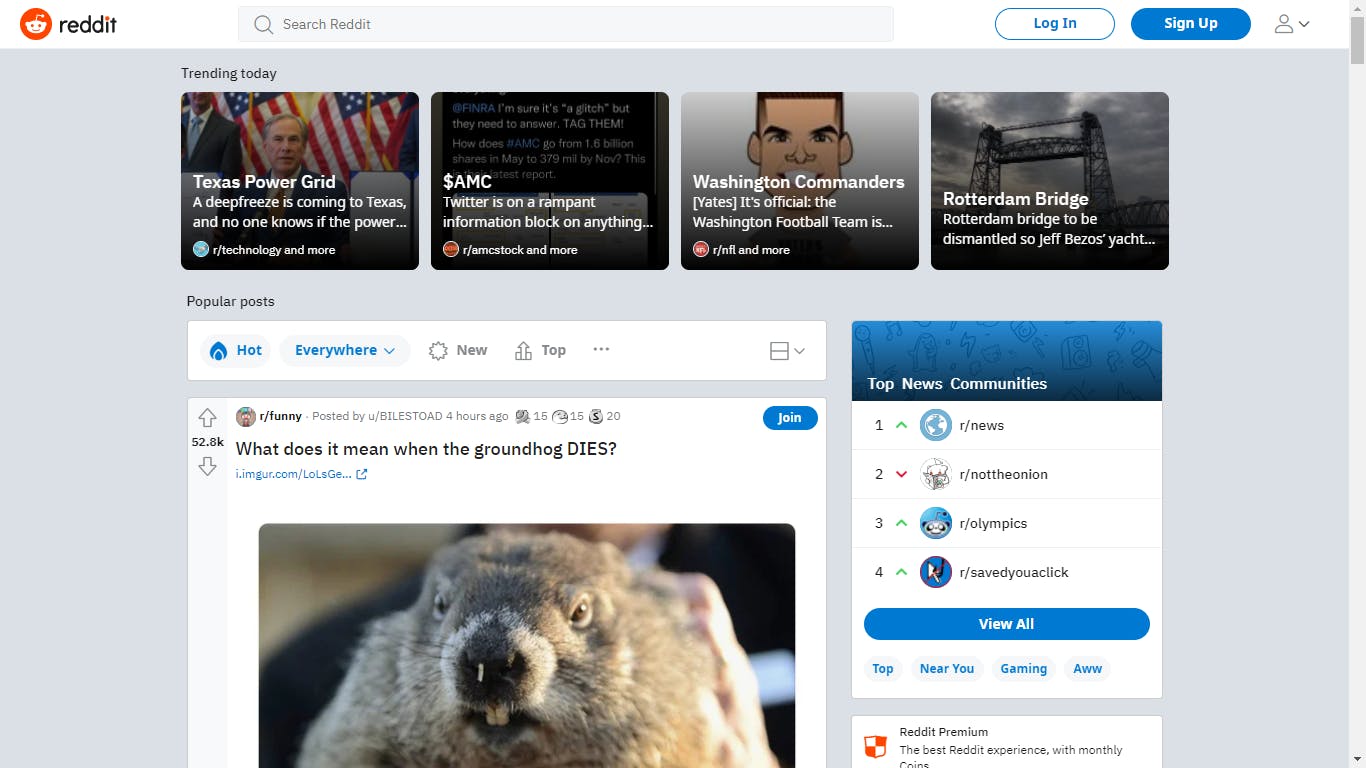
As a wise Redditor once said – you read questions on Stack Overflow, you ask questions on Reddit.
We all know that there’s no room for discussions and open-ended answers on pappa Stack. Still, pep-pep Reddit is an entirely different beast – it lets the developers talk freely not because it wants to spoil them but because it wants them to express themselves and build a sense of community.
In the end, partaking in communities is part of how we grow as people.
Even though the internet environment is now far from its collaborative origins, Reddit is still the epitome of an old online community, especially in developer circles.
Mainly because there’s an engaging subreddit for anything and everything. Do you want to join a hipster programming language discussion? Fine, there’s the Rebol subreddit for that. Do you want to follow the updates about MIT’s Twist? Just subscribe to the Twist subreddit, and updates will come to your feed.
With the traffic of 50M+ unique visits and over 100K active communities, it’s no wonder the most niche topics will have an audience here.
Regardless of how embracing Reddit can be, seeing the same question over and over will frustrate the calmest among Redditors. Please do your research before you post; it will save you a lot of karma points. Keep in mind that some subreddits will have an FAQ section, and some won’t.
An example of a great and active subreddit is webdev – it comes with topics for both front-end and back-end, a comprehensive FAQ, and job posts.
| Founded | 23.06.2005 |
| Place | San Francisco, CA |
| Built on | Python, Javascript |
| Free version? | Yes |
| Pricing | $5.99/month, $49.99/year |
5. CodeProject

CodeProject is a community of software developers that helps its members learn and socialize and give them the freshest news from the industry. Because it’s the oldest platform on the list and offers a bit of everything, it deserves to be listed as an all-purpose developer community.
With an active community of 10M+ members, CodeProject offers incentives like the ability to store personal files on the platform to its most active and revered users. Passive users can still access most of the website but can’t comment, vote, discuss or download source code.
The most popular categories on this platform are articles, quick answers, discussions, news, insider news, and the lounge.
The articles on CodeProject cover all imaginable topics that could interest you as a developer. They’re a great way to learn, stay in the know, or just geek out. Another benefit is that you can filter them by score and tags, something you can’t do on Hacker News.
The quick answers section is where you come to problem-solve. It’s a typical Q&A forum that you can filter by tags, status (answered/unanswered), recency, and rating. It’s an active forum where you’ll get your answers quickly.
When you get sick of asking and answering questions, you can follow discussions about various programming topics in the discussion section. To participate, you’d have to register an account o CodeProject.
The news covers all topics imaginable, while insider news focuses only on the scoop from IT and software development.
The lounge is where you go to mingle with other members of CodeProject. There’s one strict rule, though. No programming questions!
Additional features include competitions and surveys. Competitions are a great way to test your skills and even win prizes. Surveys range from development-specific to random ones like „what’s your New Year resolution“ and are an excellent way for you to test the community's pulse.
After witnessing its sheer versatility, we wouldn’t be surprised if you decided to make CodeProject your only developer community.
| Founded | 1999 |
| Place | Canada |
| Free version? | Free only |
6. WebDeveloper.com
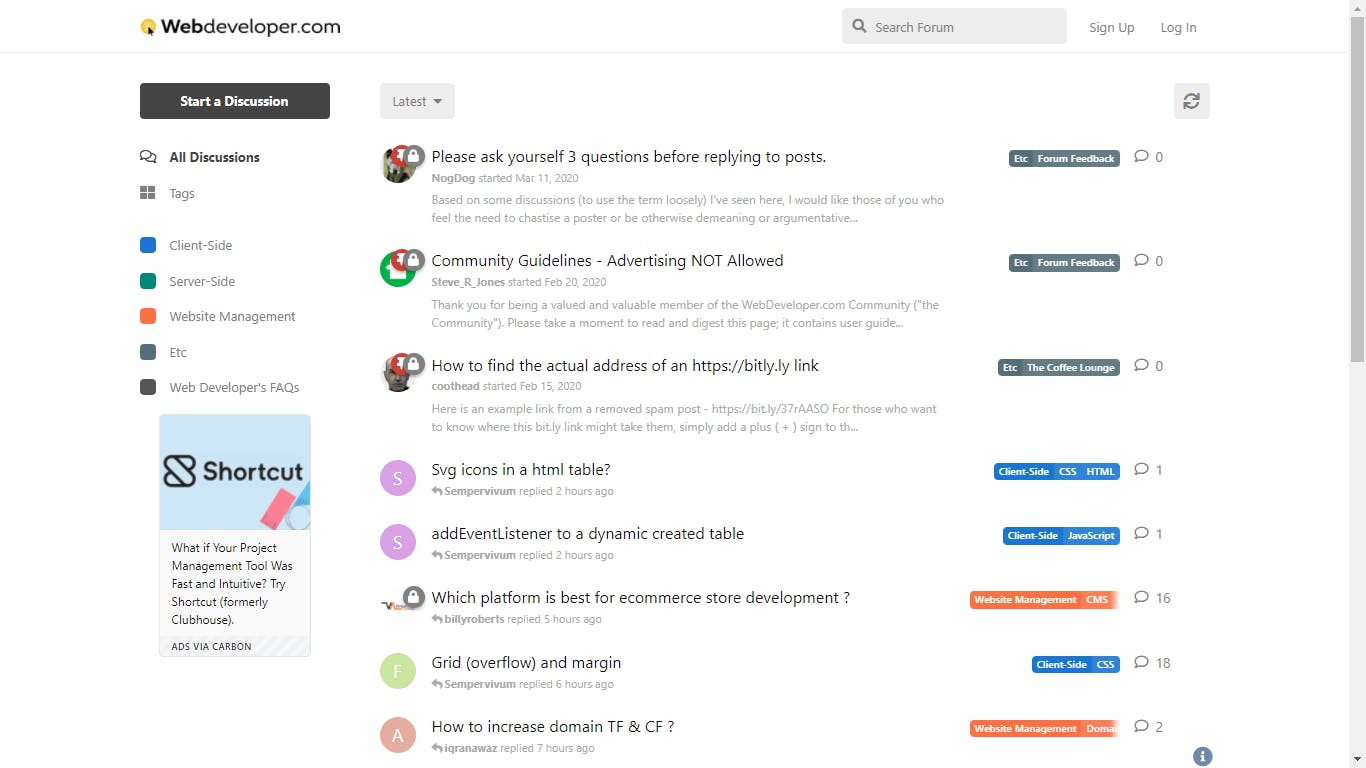
Webdeveloper.com is a developer community forum that goes straight to the point. There’s almost nothing here but questions and answers on software development topics. The topics are neatly arranged into:
- Client-side
- Server-side
- Website management
- Etc (computer issues, forum feedback, jobs, the coffee lounge)
- Web developers FAQ
Its key benefit is that they will not shame you for beginner questions unlike someone like, let's say Stack Overflow.
Job posts are frequent, and you’ll generally see a couple of them each week, but most of them do seem a tad sketchy, to be fair. Very few job posts point to a company's website looking for an employee, and most of them are from individuals looking for specific one-time tasks.
Collaboration communities
Collaboration is in the DNA of (most) software engineers. There are so many examples of excellent software made thanks to collaboration through the open-source approach: Linux, Apache, Gitlab, jQuery, Mozilla Firefox, and the list goes on.
The following two communities show what developers can do when they join forces.
7. GitHub community
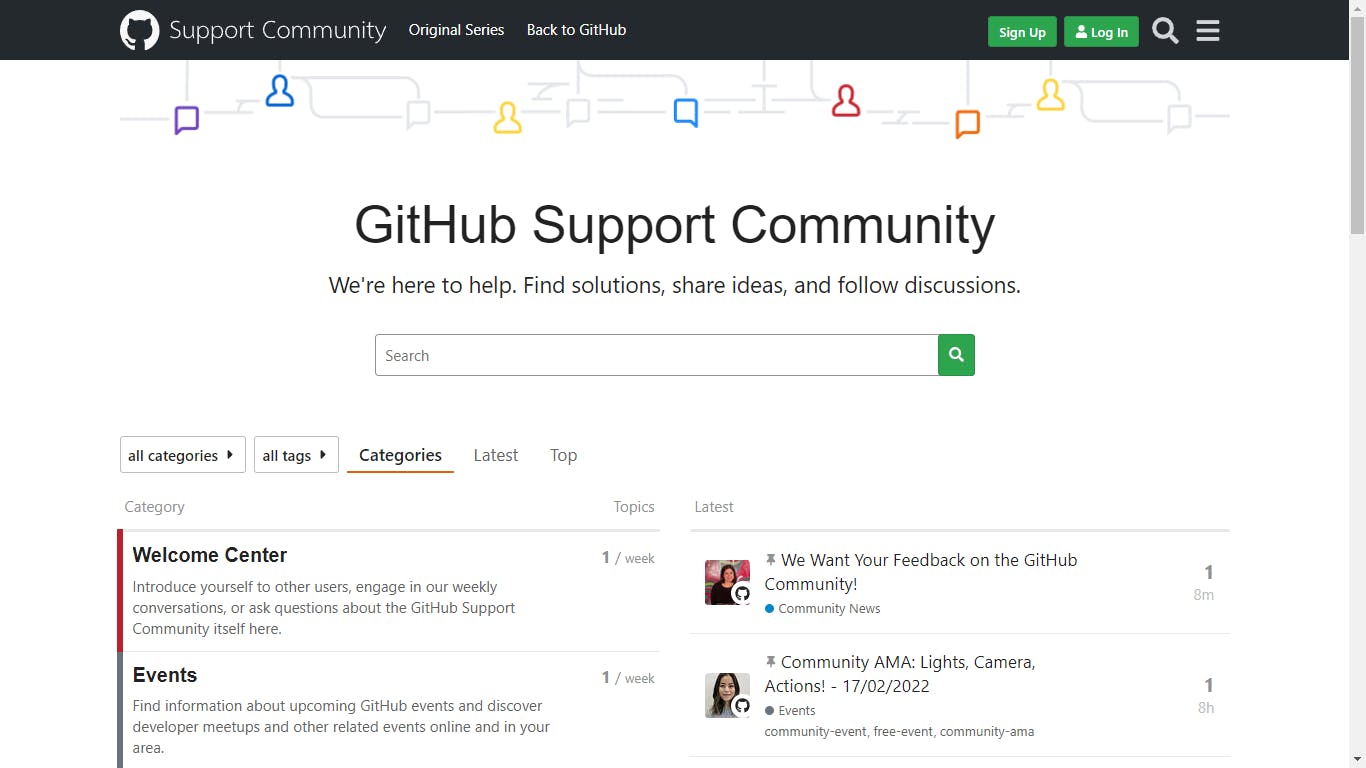
With over 73 million and over 16 million new developers, GitHub is THE open source community for engaging and collaborating with other programmers. Activity on this platform is just growing – in 2021, over 61 million new repositories were created (17 million more than in 2019), and 170 million pull requests were merged.
GitHub is more of a place to find, share and co-develop open-source code with other developers and learn coding best practices than it is a place of answers. Thanks to countless available coding resources, it is great if you’re learning to code.
You can communicate with fellow programmers within the platform by using these GitHub features: issues, pull requests, and discussions.
Issues are great for tracking ideas, tasks, bugs, or enhancements within a repository.
Pull requests are great for proposing changes to a base branch in a repository.
Discussions are designed to keep the non-operational communication away from the project itself. GitHub Discussions is where you’d do all the planning and making announcements regarding a project.
Finally, there’s the Stack Overflowish GitHub community forum called Support Community, where you can look for platform-specific topics and learn about the upcoming events. However, it’s not as active as the rest of the GitHub ecosystem.
| Founded | April 2008 |
| Place | San Francisco, CA |
| Built on | Ruby on Rails |
| Free version? | Yes |
| Pricing | Team $40/month, Enterprise $210/month |
8. Bitbucket
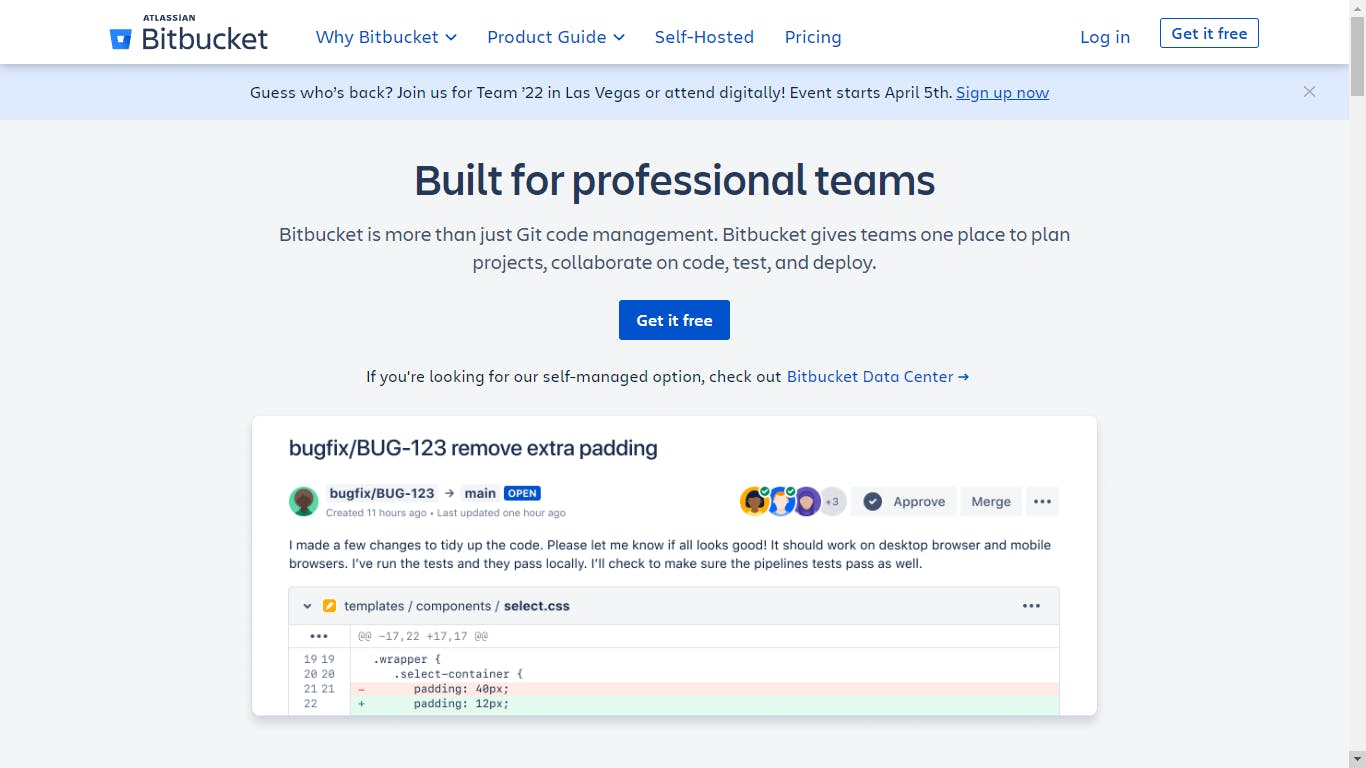
Bitbucket is a Git-based code hosting platform that allows you to plan easily, collaborate, test, deploy. It’s an Atlassian developer community with 1 million teams and 200TB of code-hosting data. Being under the Atlassian umbrella, Bitbucket integrates with Jira and Confluence. It’s best suited for small groups.
Other integrations include different cloud and server add-ons like Bamboo, Opsgenie, Docker hub, npm, SonarQube, and SVN Mirror.
It’s a value-for-money solution because it brings greater flexibility at a lower price.
It can import from Git, CodePlex, Google Code, SourceForge, and SVN. Also, being that the free plan offers unlimited private repositories for up to five users, it’s a great place for larger open-source projects.
The paid plans offer more features at a rate significantly lower than the competition.
The Standard plan is $3 per user (for up to 100 users), the Premium plan is $6 (for up to 100 users). Many features are shared among the free, standard, and premium plans, and the differences are primarily in scale. For example:
- Git large file storage is 1, 5, or 10 GB, depending on the plan
- Code insights are limited to 3 integrations on a free plan and unlimited for paid plans
On the other hand, only the Premium plan offers enforced merge checks, deployment permissions, IP allow listing and required two-step verification.
Finally, Bitbucket has advanced semantic searching that crawls your syntax instead of variable names to match your query.
One downside to it is that, since 2020, it doesn’t support Mercurial.
| Founded | 2008 |
| Place | Australia |
| Built on | Python through Django framework |
| Free version? | Free version only and no paywall either |
| Pricing | Standard $3/user, Premium $6/user |
Tech news and product updates communities
These developer communities are awesome because they’re the places where you can both stay in the loop and discuss the current trends and events in your niche or the industry in general.
One of such communities is Hacker News, probably the most reliable social news website out there.
9. Hacker News
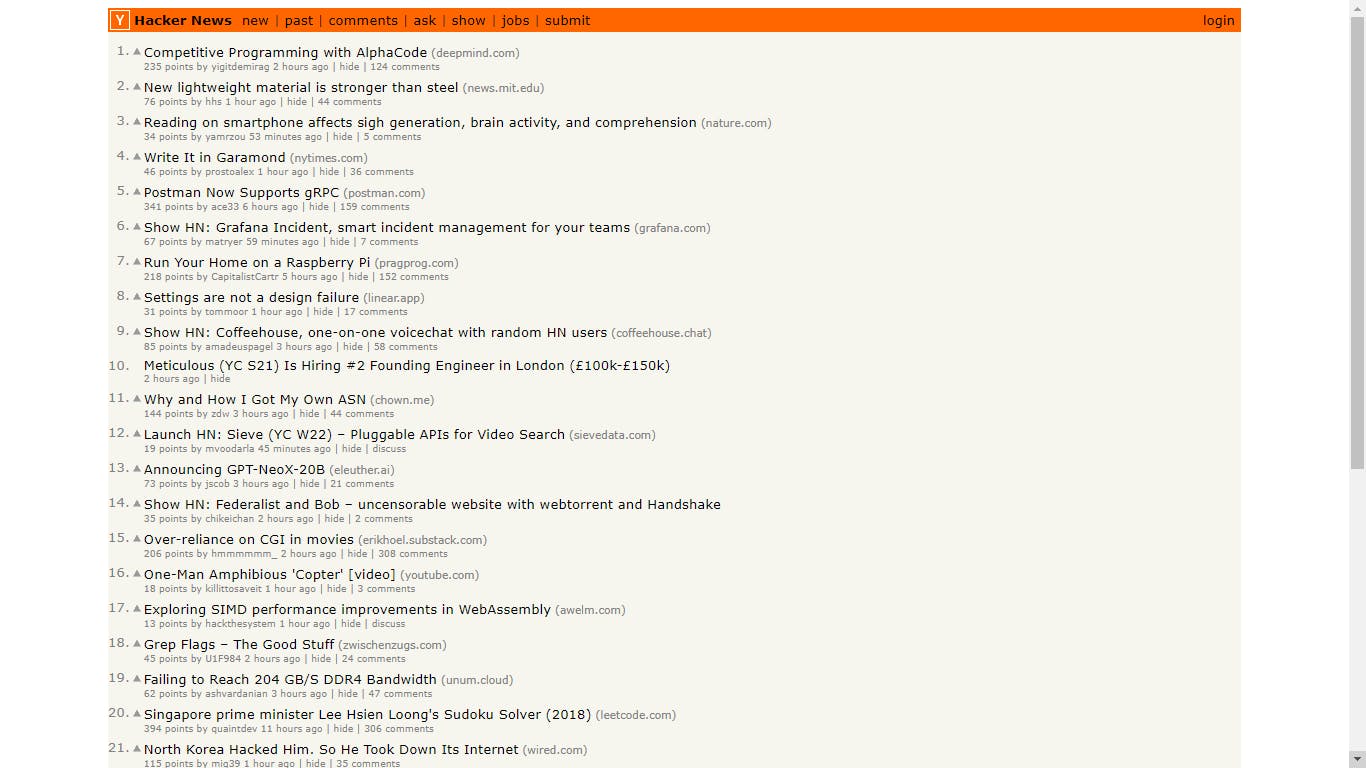
Hacker News (HN) is a social news website with a strong developer community creating, curating, and consuming content. Not only that it gives you the scoop on the latest events in the world of hacking and IT development, but it also allows you to discuss, cooperate and even find work.
It’s one of the oldest on the list, published in 2007. It was made to resemble Reddit of old, where toxicity levels were at an all-time low. Having said that, HN has a more stringent set of rules when it comes to downvoting – you can’t downvote until you’ve accrued 501 “karma” points.
To get those points, you have to publish on the platform. Even to flag a comment, you’d have to have 30 “karma” points to show for. It’s stringent but fair, and that’s why it sieves the online toxins successfully.
You can treat HN as a q&a website by posting a question in the ask section.
The show section is where you can showcase your projects, collaborate on other users’ projects or give feedback/discuss. That is what gives it the “3D” feel.
Finally, it’s your chance to land the job of your life. The job offers are updated regularly, and at the moment of writing this article, there were five job postings in one day!
The only drawback is that the website's design is painfully simplistic, representing the old-school. It’s filter-free, so you’ll have to sift through the news to find what interests you.
To be fair, the lack of filters can’t take away from all the quality content, collaboration, and learning opportunities you get when actively engaging with this online community.
| Founded | 19.02.2007 |
| Place | Mountain View, CA |
| Built on | Arc |
| Free version? | Always |
10. Product Hunt
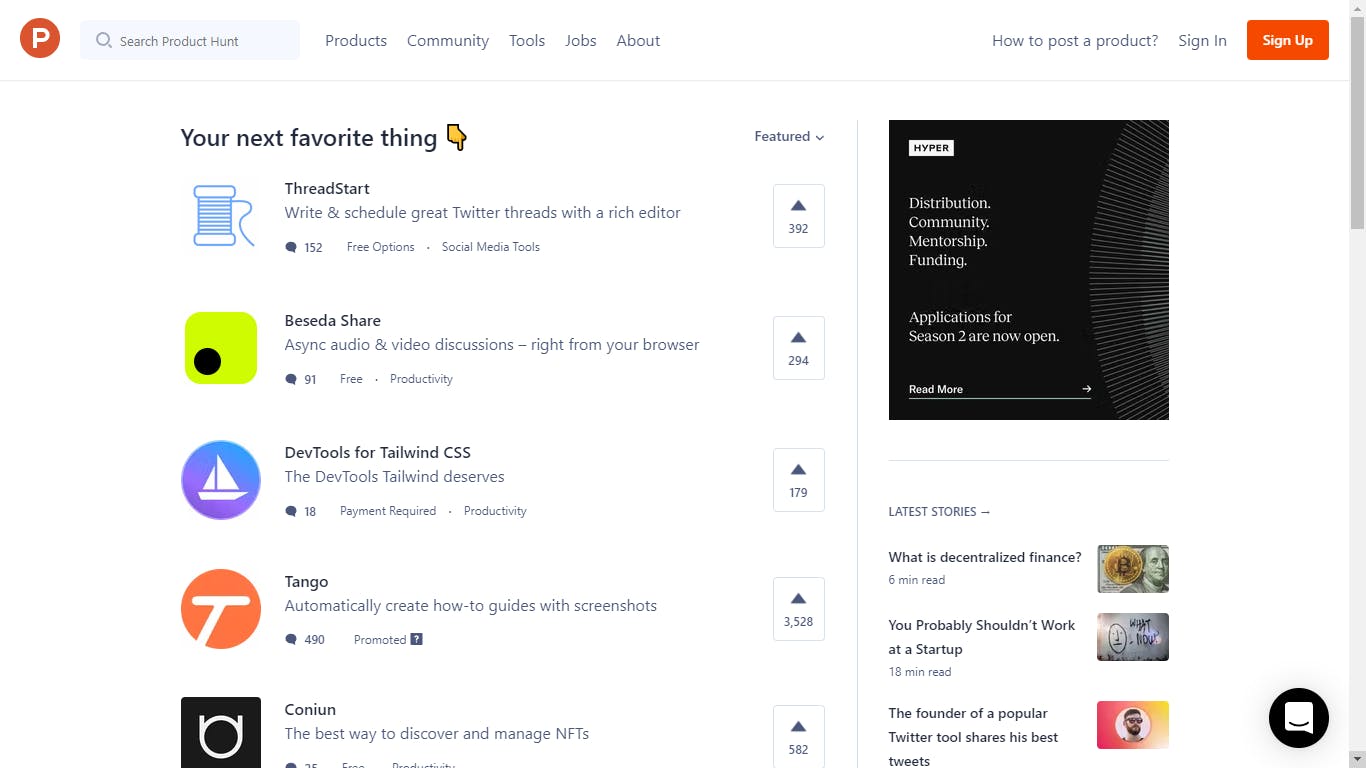
Product Hunt (PH) is a news site and the bustling community of tech, app, and web creators. If there’s a new app out there that helps you code more efficiently, chances are it was featured on PH. The voting on the posts is similar to that of Hacker News and Reddit.
As the platform nurtures software and tech creation, the community revolves around those topics more than anything else. With that said, if you’re looking to learn how to avoid NullPointerException in Java, you might not be at the right place. However, if you want advice on how to start building your product, you’ve found your tribe.
The PH community is more than just news and discussions about new apps and tech; it includes stories, events, changelog, and something that blew us away – makers grant.
Makers Grant is PH’s way of awarding the efforts of their growing community of mobile app, website, hardware, and tech developers. The best product will receive a $5000 Makers Grant from the platform each month. In the winners’ selection, they prioritize projects that are bootstrapping their business and aren’t backed by venture funding.
Of course, products have to be innovative, gritty and pass the community's engagement text. That alone makes it one of the best online communities for product developers.
| Founded | 06.11.2016 |
| Place | San Francisco, CA |
| Built on | Linkydink |
| Free version? | More than free, each month they pay $5000 for the best product on the platform |
Software development communities for beginners
We were all beginners once, not only as professionals. We were literally beginners at living. Without our parents’ or guardians’ support, we wouldn’t know how to walk or tie our shoelaces or ride a bike.
Developer communities probably understand this better than many others, and that’s why each has at least a section dedicated to beginners, where the mediors and seniors of all sorts flock together to share knowledge.
Some developer communities exist solely for one purpose – to help beginners learn how to code. This time, we’ve given you just one that’s entirely dedicated to rookie programmers.
11. freeCodeCamp
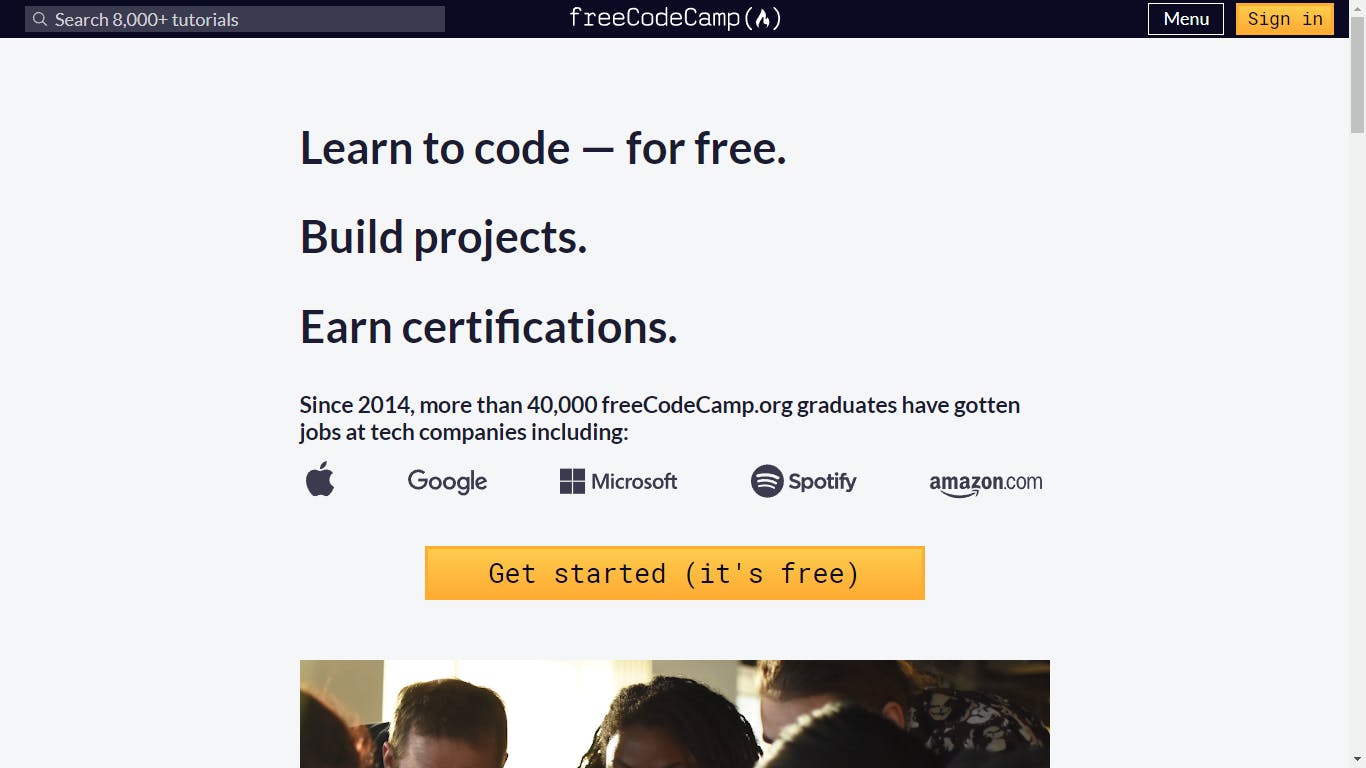
freeCodeCamp is a nonprofit developer community that helps absolute beginners learn to code by building projects. They proud themselves of helping over 40k participants find a job in development.
Over the years, their curriculum grew from lessons about MongoDB, Express.js, AngularJS, and Node.js to almost every IT developer topic imaginable. The courses you can now enroll in are:
- Responsive web design
- JavaScript algorithms and data structures
- Front end development libraries
- Data visualization
- Back end development and APIs
- Quality assurance
- Scientific computing with Python
- Information security
- Machine learning with Python
The freeCodeCommunity is active in more areas than the curriculum itself. There’s the Publication section, where you can see articles about new features on the platform, various software engineering topics, and tips for developers.
The Youtube channel also has tons of 6-hour-long lessons on topics like NoSQL databases, C++, React, Django, etc.
Finally, there’s the forum, where you’ll find most activity on the topics of Javascript, Python, and HTML/CSS. The great thing about it is that it comes in Spanish, Italian, Portuguese, Chinese, and Japanese.
Being that freeCodeCamp is a non-profit, it exists solely because of its contributions. If you are a beginner, just pick a category and start learning and if you like it, feel free to show appreciation on freeCodeCamp’s Patreon.
If you’re an experienced developer and you want to chip in more than monetarily, you can:
- Create coding challenges that are key to all the curriculums on freeCodeCamp
- Help improve the codebase using Gitpod, a free browser-based ready-to-code environment, locally or on GitHub
- Helping with localization to other languages (Spanish, Italian, Portuguese and Japanese are already live)
- Being active on the „Contributors“ category on the forum or the contributors chat room
Don’t forget that when you teach, you are also the one who learns more about your area of expertise so contributing to such a platform will bring you more than the humanitarian benefits.
| Founded | October 2014 |
| Place | San Francisco, CA |
| Built on | Open-source code available on their GitHub repo |
| Free version? | It’s a non-profit, so it must be free |
Specific-purpose developer communities
Even though most communities we mentioned so far would fit your needs, we understand that some of you would rather join a developer community specifically made for your programming language or software development interest. Below are some of our top pics.
12. CodePen
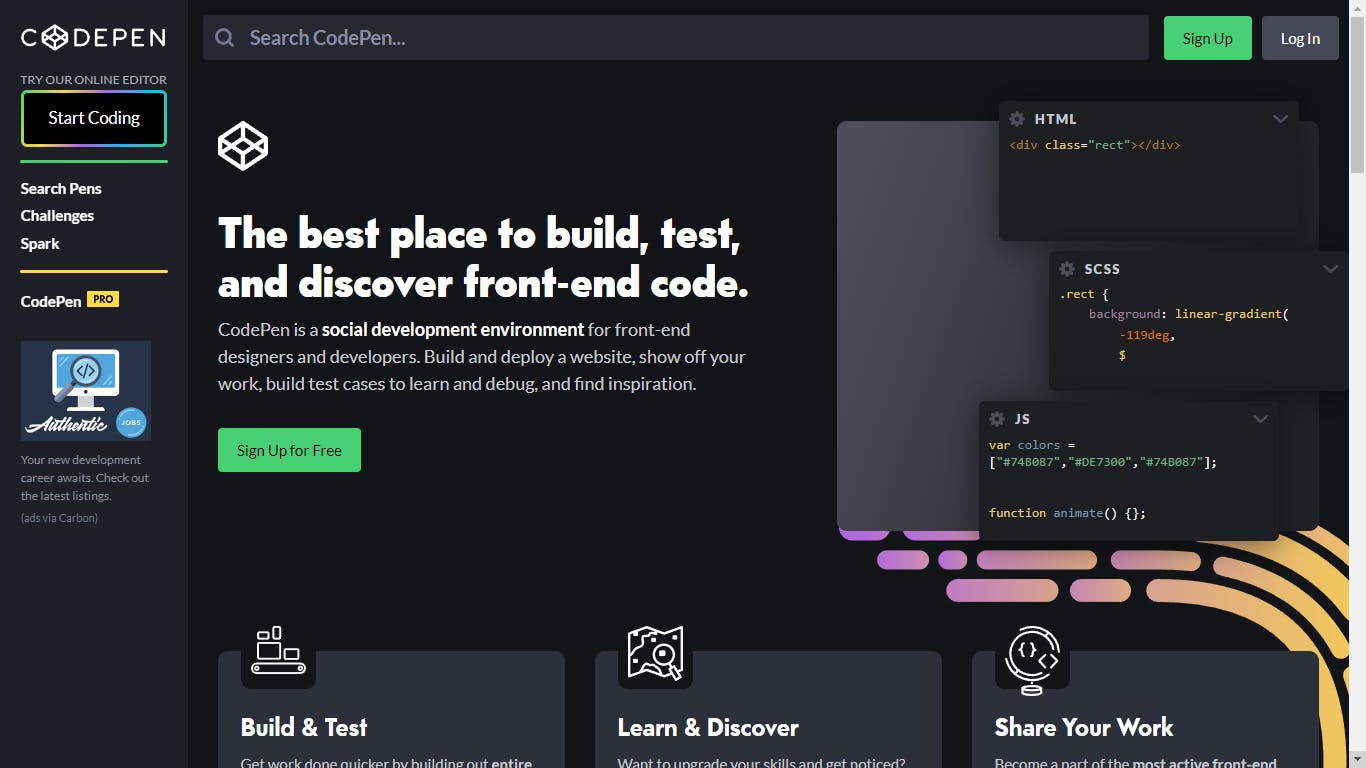
CodePen is a community of front-end developers that use HTML, CSS, and Javascript the most. It lets you see the results of your code as you write it, but what makes it a community is that you get to see other developers’ code sets or Pens and learn from them.
Not only that but you can all comment on each others’ work take up weekly challenges that are all part of a monthly topic. This is where you can up your game as a front-end developer significantly, which a thriving community such as CodePen is great for.
Even though there’s no dedicated forum on the website, you can vote and comment on other users’ pens. For further engagement, leverage CodePen’s blogs and podcasts.
There are four pricing plans on CodePen: free, starter, developer, and super. The free plan comes with unlimited public pens, collections, and templates. Paying as little as $8 a month will unlock fantastic features like the collab and professor mode.
The collab mode of CodePen allows you to work with 2-10 team members on the same code simultaneously as you all see the results of your work as it unfolds. Professor mode is excellent for training and teaching as it allows you to code in front of an audience of 10-100 people.
Other perks of paid plans include asset hosting, projects, and files, unlimited embed themes with custom CSS, no ads, no-login pen debug view, and live view.
All in all, you’d benefit significantly from CodePen by being able to learn new coding techniques or simply using public pens on your website.
| Founded | 2012 |
| Place of birth | Bend, Oregon |
| Free version? | Yes |
| Pricing | Starter $8/month, Developer $12/month, Super $26/month* |
*prices for an annual plan, monthly plan available
13. Oracle Java community

The official Oracle Java community is probably the best one for you to join. Not only because it has an active forum of 3.8M users, 2.3M discussions, and 7.9M discussions but also for those of you who want to chip in with the development of this programming language.
You can do so if you join the Java Community Process (JCP) review and provide feedback for the Java Specification Requests (JSRs). You can also submit your own JSR proposals. This is why taking part in this community from the get-go makes sense. At one point, you might be skillful enough to make Java better.
Because not all developers are at that level yet where they could contribute to the future of Java, there’s still the forum that is rich with topics for beginners, juniors, mediors, and seniors.
Various topics spark your interest – Java learning subscription, database connectivity, embedded technologies, Java APIs, etc. You can access all the topics without signing up, but as with most forums, you won’t be able to participate. An additional downside to not registering is that you won’t have access to the resources or learn how to earn points or badges, so make that small step to contribute fully.
| Founded | 23.06.1996 (the birth of Java) |
| Place | Santa Clara, CA |
| Free version? | Yes |
14. Reactiflux

Reactifulx is a community of react.js and react native developers that exist solely on Discord. That shouldn’t discourage you because all it takes is to make a user name, and you can access it as a passive observer. As far as Discord itself, it has a very similar interface to Slack.
If you joined this community to learn or improve, you’d enjoy the Welcome channel. It has super-useful links to learning resources from Reactiflux. They even suggest the learning path, which goes as follows: How web apps work, Javascript, React, Redux, TypeScript. All topics come with primary and additional reading resources.
There are also transcripts of the Q&A sessions that Reactiflux organizes every fortnight. You can even suggest the following speakers by contacting the moderators on Twitter or pinging them on Discord.
We were impressed with the Jobs section, where both employees and employers can post. Job seekers can filter the posts with the following filters: employer helps with visa, accepts remote candidates, and offers an internship / no exp. required. Legit companies often make job postings here.
As far as treating Reactiflux as a forum, keep in mind that this is still a chat community, so it will be a tad more difficult going through different topics but fear not, there’s a way to get to the information you need.
The search bar on the top right side of the screen offers search options that help you narrow down the results. The two beneficial ones are „has:“ and „in: “ The „has:“ option lets you filter messages containing links, embeds, files, videos, images, sounds, or stickers. The „in:“ option displays messages that showed in specific #channels.
| Founded | 2015 (on Discord) |
| Place | Florida |
| Free version? | By design |
15. SitePoint community

SitePoint is a developers community for client-side software developers counting 261k users, 1.4M posts, and 135k topics. This community is best explained as a forum with benefits. We say this because even though the forum is where it’s all at, there are additional perks like:
- The active blog section that puts out fresh posts a couple of times a week covering a myriad of client-side development topics
- The $6 monthly subscription to their library with tons of books, courses, and tech conference recordings, covering JavaScript, HTML & CSS, PHP, Python, Design & UX, DevOps, WordPress and more
The forum itself is built to deter spam and educate new users. There are no signatures, so it’s free from black-hat SEO hacks trying to develop domain authority like it’s 2010.
Also, there are four categories of forum members, each armed with a different set of posting privileges: new, basic, member, and regular. To not go too deep into who can do what, let’s just say that the new members can’t send private messages, reply as a new topic, flag posts, attach images or any attachment, post more than two hyperlinks in a post, have links in their about me section or mention more than two users in a post.
Yes, SitePoint is serious about nipping it in the bud regarding forum spammers. If the forum format is not for you or you feel these rules are too much. It’s not as active, though.
Finally, let’s get back to that $6 library subscription. We like it because it gives you enough time to assess a couple of books you are on the fence about and see if they’re worth your money.
| Founded | 1999 |
| Place | Melbourne, Australia |
| Free version? | Yes |
| Pricing | $6/month for unlimited access to books, courses, and conference recordings |
16. Digital Ocean community
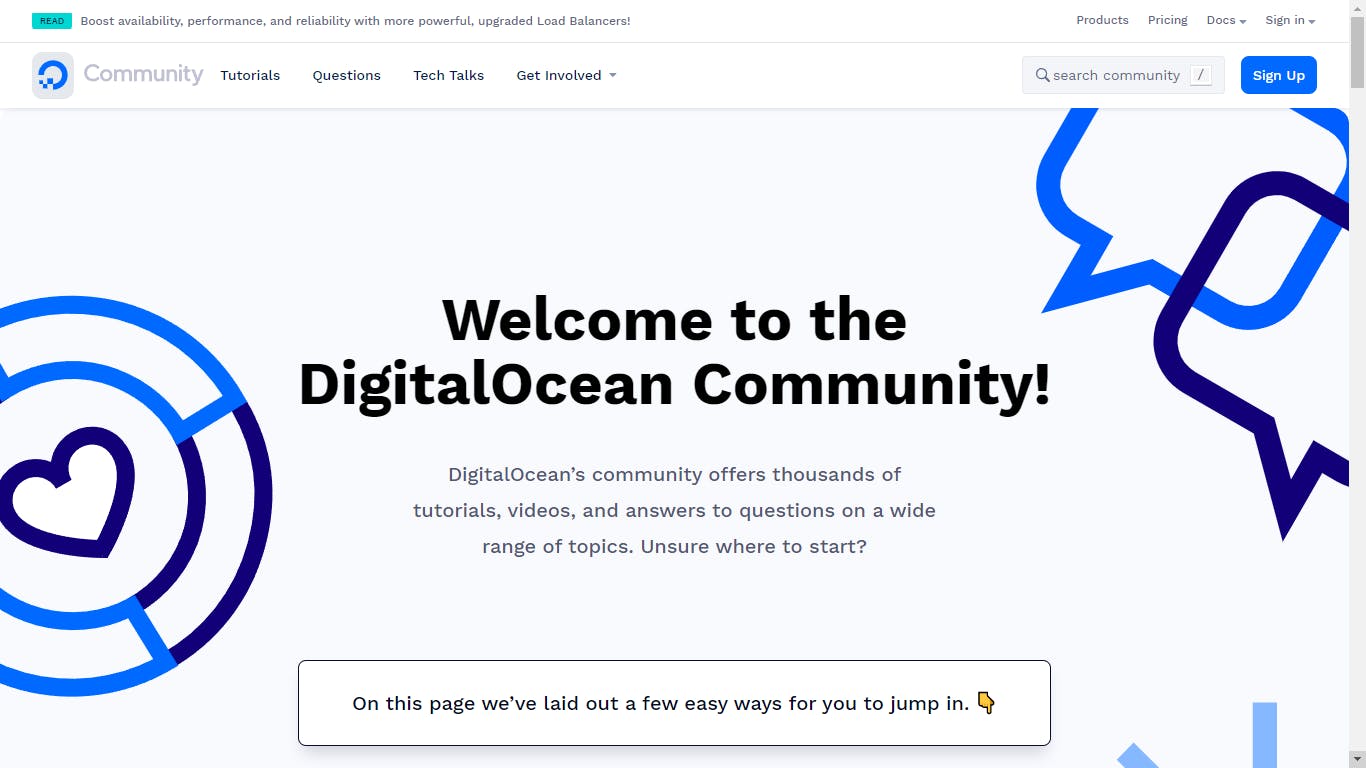
Digital Ocean helps developers (especially those of the open-source persuasion) create multiple virtual servers to host their apps securely. It has 14 data centers, 598k+ customers and is present in 185 countries.
The community of this Infrastructure as a Service (IaaS) provider helps them expand and share their knowledge and even make a positive impact on the world around us.
There’s an ample choice of various tutorials, ways to help fund growing tech startups, an archive of tech talks, and a forum.
Tutorials cover topics about cloud computing and then some. The most popular tags are Linux basics, Javascript, Python, Docker, security, Apache, MySQL, databases, Kubernetes. They’ve recently included interactive tutorials, where you’d be able to practice what they preach in real-time (pardon the pun).
If you are a nonprofit or a tech startup that aims to aid society as a whole, you can do so by joining „Hollie’s Hub for Good“ and telling more about your project.
If you are in a mood to help such startups and nonprofits, you can write content for Digital Ocean. You get paid around $300 per article, and you get to select a startup/nonprofit that the company will give financial aid to.
Like any other developer community, this one also has a forum. It’s not their strongest asset, as its filtering is moderate, and there’s even a bug on it. Each question is displayed as not answered yet, even though many of them are full of comments. To add insult to injury, this prevents you from using the few available filters. Still, it can’t outweigh all the other abundant benefits of this cloud computing platform.
| Founded | 24.06.2011 |
| Place | NYC |
| Free version? | Yes |
| Pricing | All community content is free |
17. WordPress.org
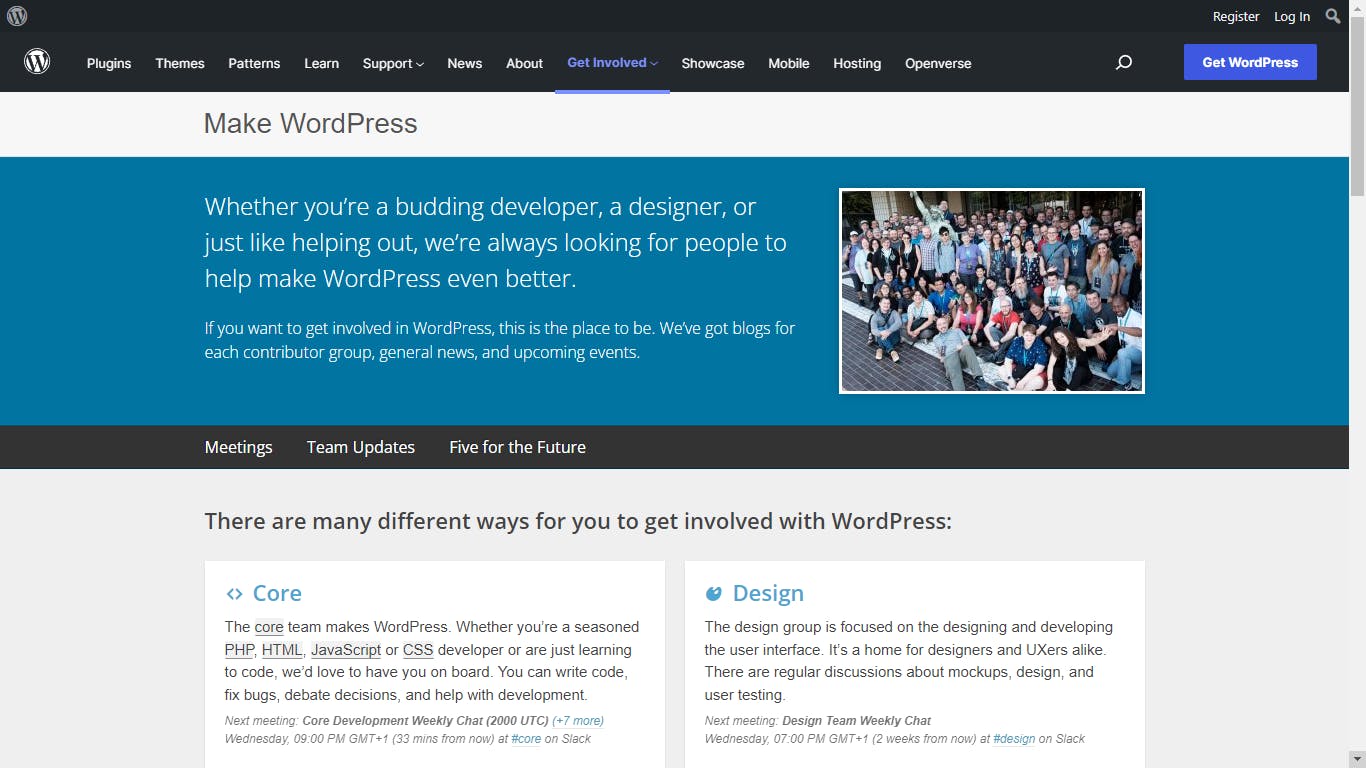
With over 30 million live websites, WordPress is the most popular CMS out there, and as such, its website is THE WordPress developer community for both WP rookies and pros.
This community is home to countless workshops and lesson plans. You can filter workshops according to series, topic, language, subtitles, and WordPress version to get to what you want to learn.
If you hate learning on your lonesome, join the social learning program that lets you pick a date and a time on the calendar and hop into the classroom on Meetup.
Lesson plans are where you go to flex your WP muscle. There are lesson plans for WordPress developers of all levels and different instruction types to go through – demonstration, discussion, exercises, show & tell lecture, and tutorial.
Once you become a WP bodybuilder, you can even contribute by making your own workshop.
There are other areas where you can contribute to the WordPress community:
Find and fix bugs in the core code, lend a coding hand to the mobile team if you know Java, Objective-C, or Swift skills, test the WP versions on iOS, develop themes, translate.
Finally, you can give the most fundamental support by answering questions on the forum.
The forum itself is not one of the best ones out there. It’s missing tags, badges, or any filters other than the very basic ones. Still, it’s a place to congregate and help a fellow developer in need.
| Founded | 21.11.2005 |
| Place | San Francisco, CA |
| Free version? | All community features are free |
| Written in | Javascript and PHP |
18. Magento Forums
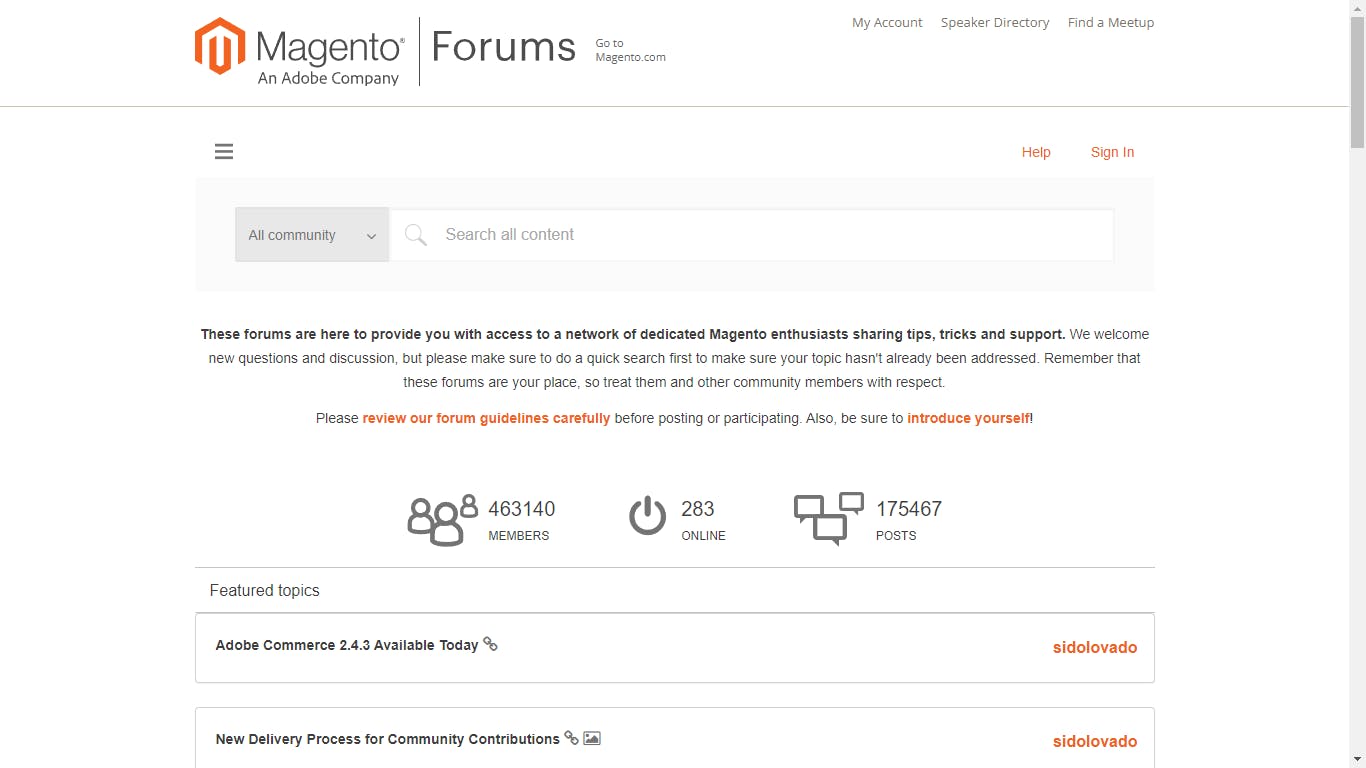
If you’re looking for a Magento developer community outside of the ones commonly found on subreddits and dev tags, the official Magento Forums is the place to be. It has a strong community of over 400k members and more than 175k posts.
Forum topics are categorized as core technology (for versions 1.x and 2 separately), extensions, general discussions, Magento business intelligence, international communities, Magento U, and news & announcements.
In addition to the forum, there’s the DevBlog section with plenty of articles. You get to access the latest articles search blogs by the label. The community is actively commenting on the blog posts.
On this platform, you can mingle with fellow magentees from your country or at least with those that speak your language. There’s a separate forum for the following languages: Chinese, Duch, French, German, Indian, Italian, Polish, Portuguese, Russian, and Spanish.
The Magento expert forum was a great alternative to this forum until it became festered with spam.
19. Blockgeeks

Blockgeeks is a blockchain developer community designed for both rookies and pros. To be fair, there’s more content for beginners, here but there’s also enough content AND opportunities for blockchain and crypto experts to make great use of the platform.
The website is primarily educational, being that it hosts over 650 blockchain-related courses and lessons, has 77k students that have finished more than 25k courses and more than 82k lessons.
You can access some content without making a free account: articles, guides, the forum, and videos. You’d have to register to gain access to free courses and the learning track program. What’s good about the free account is that it gives you access to:
- Over 50 lessons
- Over 200 articles
- Useful 101 guides on everything blockchain
- Short videos cover topics like forking, airdrop, decred, EOS, privacy coin, BAT, how to read crypto charts and more
Once you’re done with them, you can move up to a paid plan to learn the rest. There are three plans you can choose from:
- Pro monthly ($15/month, free trial available)
- Pro annually ($72/year, free trial available)
- L+earn pro lifetime ($297)
Any of the three will give you full access to all the content on the website, where the lifetime plan comes with discounts on blockchain and crypto products.
There’s also the forum called „Ask Blockchain Community“accessible to passive participants. As far as format goes, this forum could be better. It’s only got basic filters: new, popular, open, and solved. Even though there’s no tag filter, you have to write at least one tag when posting a question. Still, it’s a good place to ask and receive help. This is the first place a blockchain pro can contribute to the community.
For all you blockchain intermediates and experts, there are free infographics about the blockchain technology and crypto you can use on your website as long as you provide a backlink to Blockgeeks.
You can also write for Blockgeeks in exchange for exposure and backlinks. There are two plans to choose from:
- Community partner basic – $29/year for a directory-type backlink to your website (no writing permission though)
- Pro community partner – $497/month for two monthly articles, private forum, and exposure to Blockgeeks community via social media and newsletters
| Founded | 2016 |
| Place | Toronto, Canada |
| Free version? | Yes |
| Pricing | From $15/month to $297 for the participants and from $29/month to $497/month to contributors |
20. Gamedev.net

Gamedev.net has been around since 1999 and is the home to a community of selfless game developers who are more than willing t share their knowledge with their peers. All the content on the website is member-made. That includes tutorials, projects, blogs, news, portfolios, and the forum.
Tutorials mainly cover game development and programming, but you can also learn about visual art, music and sound FX, event coverage, business and law, interviews, and career development.
Of course, you can do more than learn here. The developer blogs are a great way to follow your Gamedev.net buddies’ progress, get the industry updates, and even post blogs yourself.
The projects and portfolio sections are where you and other members can post your recent work or advertise your websites, SoundCloud channels, etc. On projects, you get to post direct links to your website if you want to, and you’ll even get a do-follow link for it. On the portfolio, links are plain text.
Finally, the forum is separated into the following channels: for beginners, programming, visual arts, business, audio, game design, community, and affiliates. There are no filters, so you’d have to use either the search bar or the given categories.
The overall experience on Gamedev.net is a great one. There’s enough information and conversation to go around for any type of game developer. The only thing we disliked about the experience was the invasiveness of display ads.
| Founded | 1999 |
| Place | San Diego, CA |
| Free version? | Only |
21. Thales – IoT developer community

Thales IoT developer community has the word community in its name for a reason. The members contribute to the vast database of documentation, FAQ’s showcases, tutorials, and the forum is a lively place where IoT devs are helping one another.
People are writing about Cinterion module services, MIMs, services, wireless modules, and more in the knowledge base. That is a great resource for IoT beginners but also an opportunity for experts to share ideas and knowledge so that the community can continue to grow.
Like SO and Reddit, there’s a ranking hierarchy in the forum, and you can see the leader board. You can even access the top-performing profiles to see their contributions to the knowledge base.
Thales forum is a lively place where you can ask, answer and discuss cellular hardware, Cinterion ® module services, and MIMs, join a global discussion group. Technically, the forum could be better as it provides no filters and no boolean search. At least, the members are actively responding to questions.
| Founded | 2013-2014 |
| Place | France (Thales Group) |
| Free? | Yes |
Mobile developer communities
In Statista’s survey in 2021, 46% of respondents said they use their smartphones between five and six hours a day. That’s a part-time job worth time, which translates to more work for mobile developers. Let’s see the two communities for this expanding tribe of programmers.
22. Developer.android
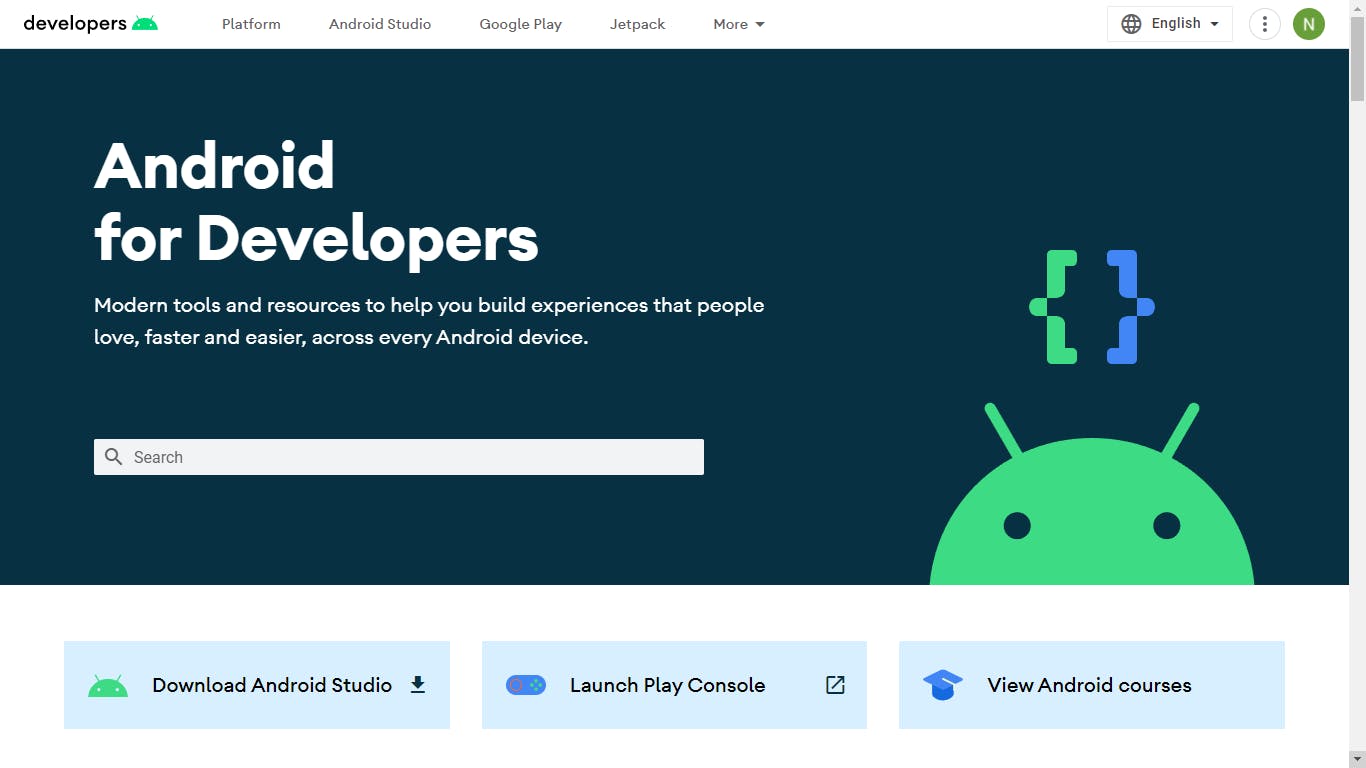
Being the best place for android development information and guidelines, developer.android deserves the nod, even though it doesn’t have a dedicated q&a section on the website. It directs you to its communities on SO and Twitter instead.
This community truly stands out because of the sheer documentation and learning opportunities. You can learn anything from what’s new with Android 12 and Android Studio to how to use Google Play, how to develop games and apps in Jetpack and Kotlin.
In the best practices of the documentation section, you can read about dependency injection, testing, performance, accessibility, security, and emerging markets. Code developer topics cover a wide range, from Android app bundles to Camera X and connectivity.
Finally, you get access to sample code and distribution tips.
In addition to giving you ample opportunity to learn, developer.android should be the first place you look for android updates and industry news. There’s also an extensive database of blog posts covering topics like Android O, Android Studio, design, develop, and Google Play.
Don’t forget, should you have any questions, there are links to SO and Twitter communities, but you could also try dev tags and subreddits.
23. Developer.apple
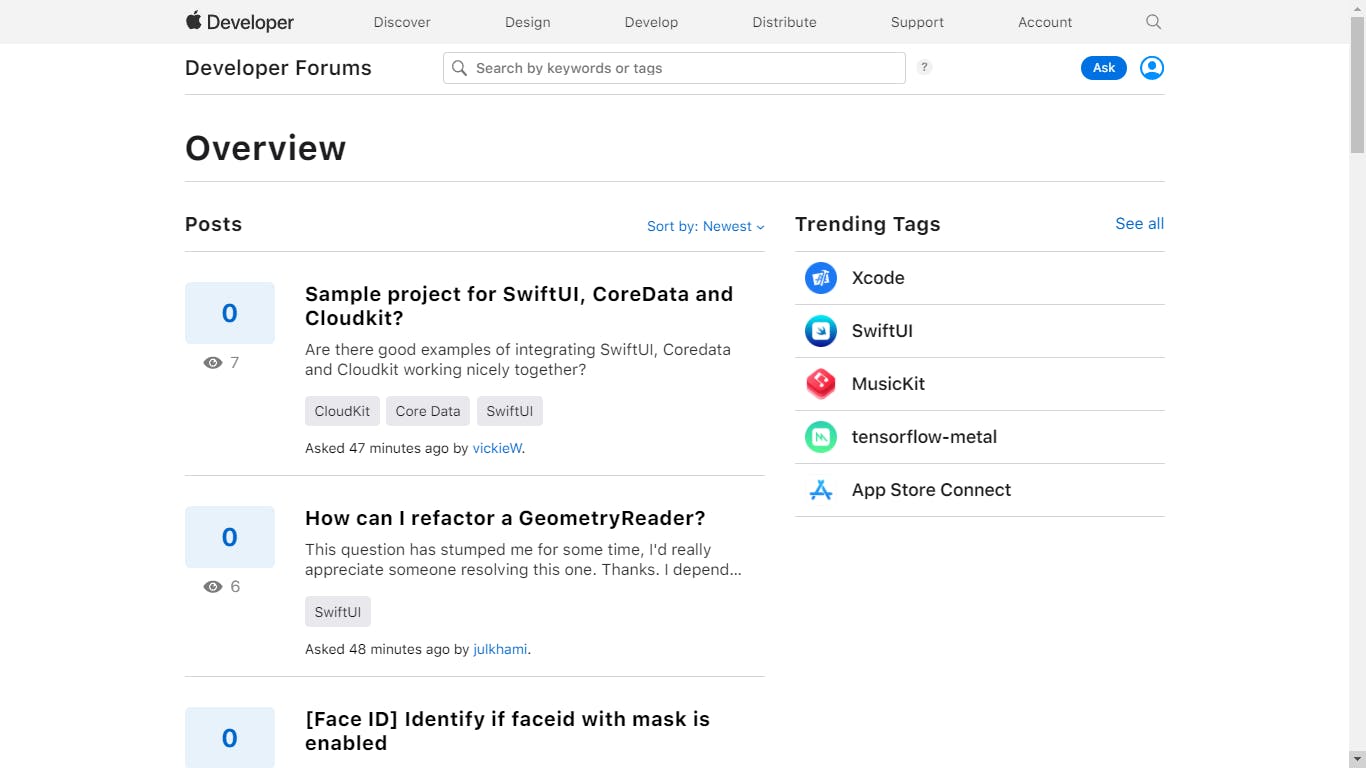
Developer.apple community is a host to everything iOS developers need, especially those at the beginning or midway through their journey of becoming experts.
Unlike the one for android devs, this community has a functioning and active forum on the website. Trending topics are Xcode, SiftUI, MusicKit, TensorFlow-meta, and App Store Connect. We liked the search bar that shows you suggestions for boolean search.
There are tons of helpful documentation to help you learn or improve your Xcode and Swift skills, with tutorials and sample codes available for free. You also don’t need to use your Apple ID to access this.
If you’ve developed an app you’d like to sell on the Apple Store, this is the place to learn how to submit those apps correctly. You can also report bugs through this community.
Another free-for-all feature is the video library that even has hour-long videos about design, developer tools, Swift, and more. There are also recordings of the Apple Worldwide Developers Conferences.
Finally, if you’re not already following Apple on Twitter, you can get the latest updates from the news section.
Communities for developers to land a job at
We’re finishing off the list with some job opportunities for you. Keep in mind that you can look for jobs in the majority of the already mentioned communities, especially the heavy hitters like SO and Reddit. However, if you want an alternative to that, Angel.co and the Technology Jobs LinkedIn group could be just what you’re looking for.
24. Angel.co
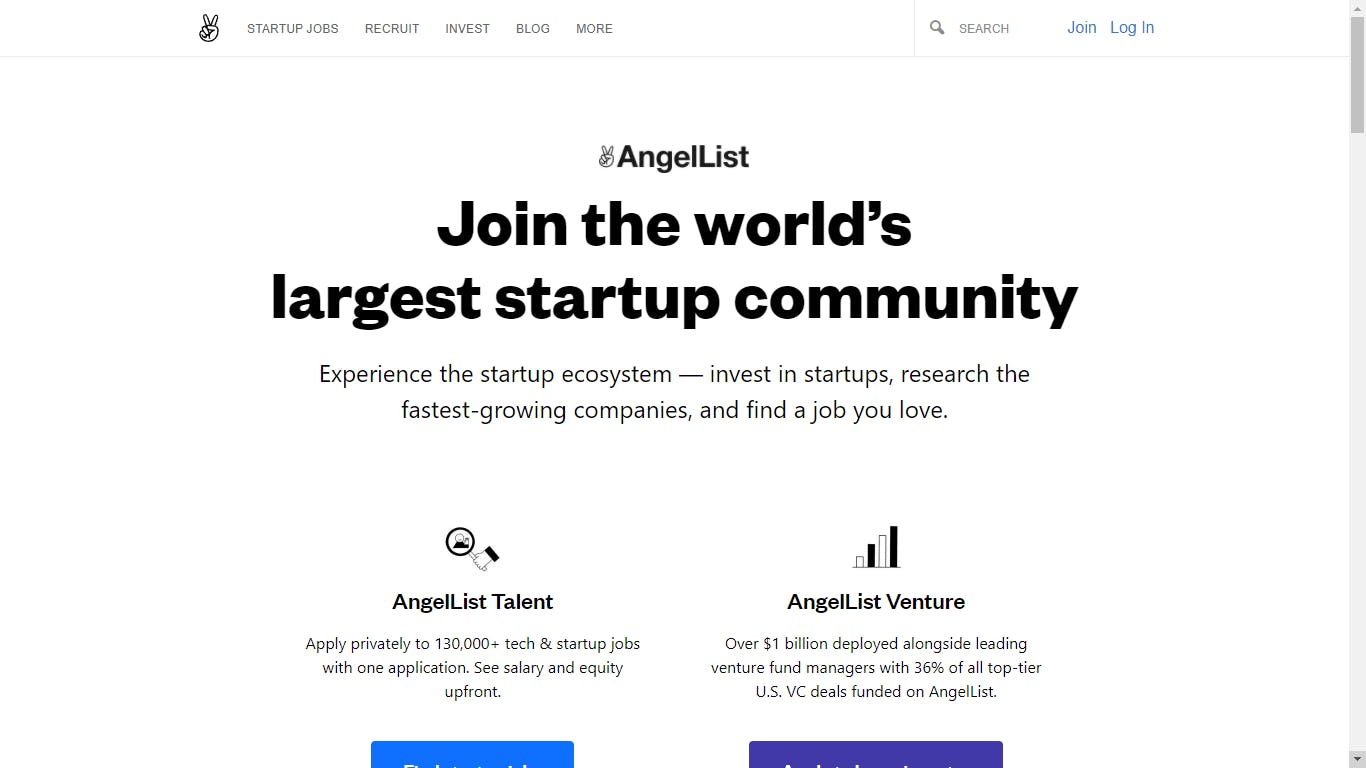
Angel.co is a community in the sense that it gathers developers who want to work in startups. The website is a niche recruiting platform that understands that not every programmer appreciates the unpredictable nature of a career in such a business. They pride themselves on being the #1 startup hiring platform.
Unlike some recruitment websites, you can apply to all jobs on Angel.co for free. They also guarantee you total privacy if you are job hunting while employed.
In addition to the job feed, there’s the blog area, where you can learn everything from the salary range in your field of expert tips from top HRs to startup and venture capital news.
The „Today in Tech“ area is where you can share news about programming, productivity, marketing & sales, management, and business as a registered member. This website area gives it a forum feel because you get to interact with other members.
The one downside is the website’s technical glitches. For instance, Once you enter the „Today in Tech“ page, you can’t go back to the homepage, even if you change the URL. There’s also no way to navigate back from the blog once you enter it.
Either way, it’s worth the trouble if you are keen on working in startups.
| Founded | 2012 |
| Place | San Francisco, CA |
| Free version? | For job seekers, yes |
25. Technology jobs LinkedIn group
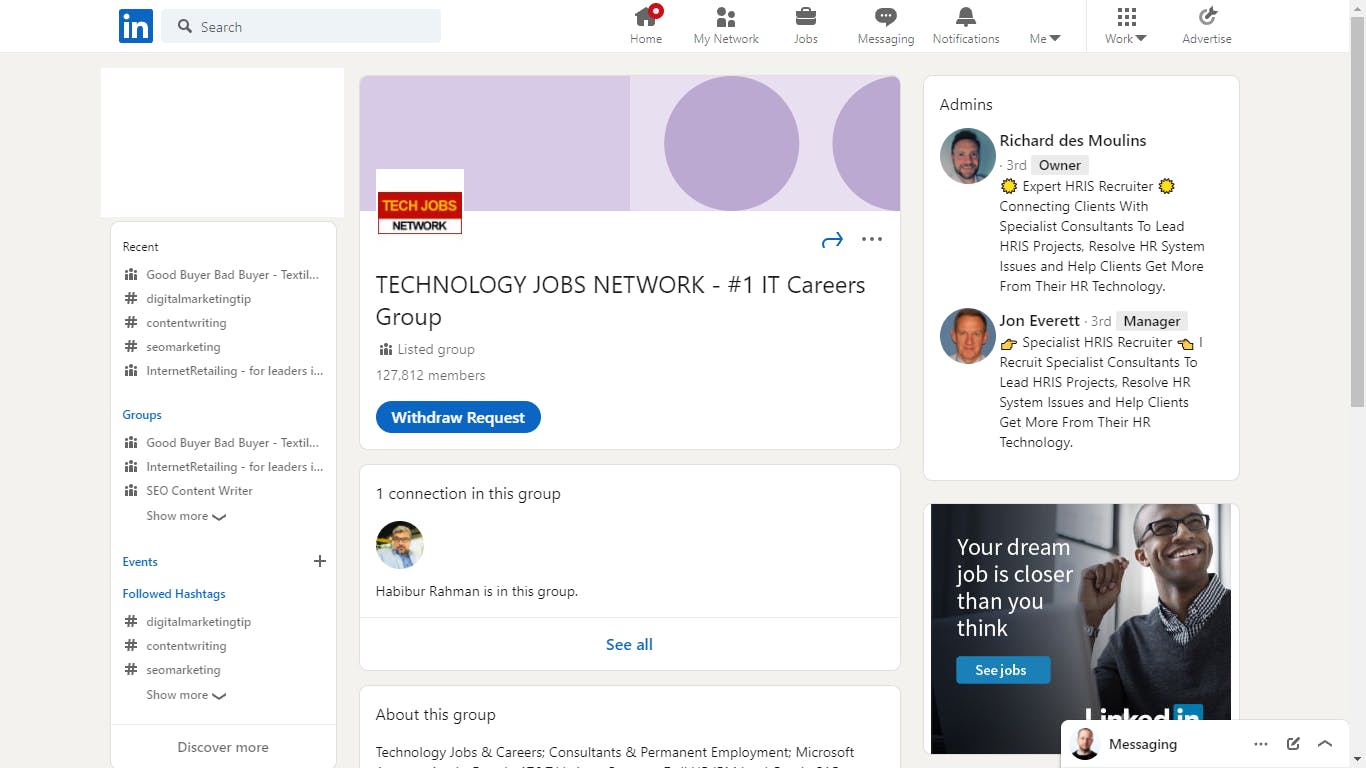
LinkedIn is a business social network serious about matching companies with top talent (they made $10B as a recruitment middleman). If you have a profile on the platform, there’s a great chance that at least one recruiter has contacted you in the last year alone.
If you want to get in touch with them regularly, join the Technology Jobs Network. It has over 120k members, regular job postings, and a lot of valuable additional content like tips on how to impress recruiters on an interview or how to make an eye-catching resume.
Conclusion
After going through all the 25 developer communities, you can see they come in all shapes and sizes: the one-size-fits-all types, the ones that target developers’ specific needs, communities that like to blog about software development, communities that teach, and the ones that bring you the scoop. They’re all gathered around the same idea – collaboration, growth, and giving back.
We hope you found at least one that you’ll keep coming back to, be it as an apprentice, a master, a contributor, or an industry updates freak, and reading all this has inspired you to give it a go at contributing – hop on to Hashnode and share your skills with our community.
FAQ
What makes a good developer community?
Engaged and respectful developers make a good developer community, but they’re not the only constituent. A well-structured, fast, and user-friendly website with a forum section built to fend off spam and a toxic environment, an already-existing knowledge base, and passionate founders are equally important. The latter is probably the root of all other makings of a good online tribe of developers.
How do you grow a developer community?
You can start by being proactive in the existing developer communities. The next step would be to grow a content base and split it in two. Make one half immediately available and make the other half a slow-burner by releasing it gradually. At one point, visitors will start creating their own content, which will spur the growth of your website authority.
Once you have an active members base, engage with it as fast as possible, even if it means hiring more trustworthy people to do so. You must satisfy your community’s thirst for knowledge to keep them from looking elsewhere.
If you’re not a data analyst, find one that can feel the pulse of your audience. That way, you’ll know where the traffic is coming from, where the engagement is at its all-time high and the all-time low. Without good data analysis, you can’t find growth opportunit

